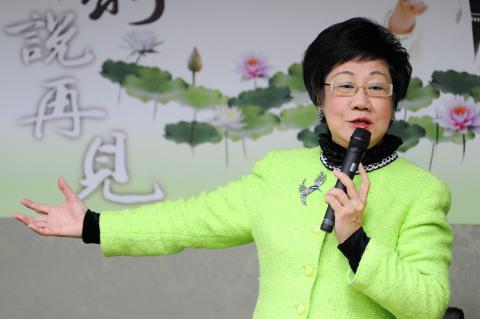Former vice president Annette Lu (呂秀蓮) made it clear yesterday that she will run for president next year, a decision she said she would formally announce on Monday at a public rally in Taipei.
Lu, who was former president Chen Shui-bian’s (陳水扁) running mate in 2000 and 2004, said she was prompted to enter the campaign by the recent row with the Philippines over the deportation of 14 Taiwanese fraud suspects to China.
She said both the Chinese Nationalist Party (KMT) and the Democratic Progressive Party (DPP), to which she belongs, mishandled the incident.

Photo: George Tsorng, Taipei Times
If Taiwan’s international status remains unclear and the ruling and opposition parties are only capable of mudslinging, “the Philippines incident will only be the beginning of many problems facing this country,” she said.
Asked why she thought former premier Su Tseng-chang (蘇貞昌) and DPP Chairperson Tsai Ing-wen (蔡英文) have higher poll ratings than she does, Lu said that was because they both ran for office recently, so it was only natural they had greater popularity now.
“How could they not enjoy the media limelight?” Lu said.
Su was the DPP’s candidate for Taipei mayor in November and its vice presidential candidate in 2008. Tsai was the DPP’s candidate for New Taipei City (新北市) mayor in November and has been DPP chairperson for the past three years.
Saying her experience as vice president has made her uniquely qualified for the presidency, Lu said she wants to deal with many of the issues she could not tackle as vice president because of the constitutional limits on that office’s power.
She challenged the DPP to find another candidate who has the expertise to compete against President Ma Ying-jeou (馬英九).
“Given Ma’s educational and political experience, which DPP candidate is strong enough to beat him?” Lu asked.
She said the DPP would poll 15,000 people by telephone as part of its primary process, with questions that put the various DPP presidential hopefuls up against Ma.
Lu vehemently opposed the party leadership last month when it decided to change the nomination process and use a national poll to select its presidential candidate. Lu wanted party members to have more of a say in the nomination process.
Lu was skeptical of the process yesterday, saying it was “not that easy” for all the DPP factions to “discuss and coordinate” and agree on a candidate.
However, she said she would support a candidate if she believed that person had the ability to handle Taiwan’s “five crises” — a phrase commonly used in DPP circles to refer to national sovereignty, military readiness, diplomatic isolation, financial stability and the prosperity of the people.
Tsai and most DPP lawmakers yesterday said they would respect Lu’s decision to enter the race, one was not happy that Lu had been so critical of Tsai and Su.
“She should talk about the nation’s major issues, instead of acting childishly and criticizing the party’s chairperson or the former premier,” DPP Legislator Kuan Bi-ling (管碧玲) said.

CHAOS: Iranians took to the streets playing celebratory music after reports of Khamenei’s death on Saturday, while mourners also gathered in Tehran yesterday Iranian Supreme Leader Ayatollah Ali Khamenei was killed in a major attack on Iran launched by Israel and the US, throwing the future of the Islamic republic into doubt and raising the risk of regional instability. Iranian state television and the state-run IRNA news agency announced the 86-year-old’s death early yesterday. US President Donald Trump said it gave Iranians their “greatest chance” to “take back” their country. The announcements came after a joint US and Israeli aerial bombardment that targeted Iranian military and governmental sites. Trump said the “heavy and pinpoint bombing” would continue through the week or as long

TRUST: The KMT said it respected the US’ timing and considerations, and hoped it would continue to honor its commitments to helping Taiwan bolster its defenses and deterrence US President Donald Trump is delaying a multibillion-dollar arms sale to Taiwan to ensure his visit to Beijing is successful, a New York Times report said. The weapons sales package has stalled in the US Department of State, the report said, citing US officials it did not identify. The White House has told agencies not to push forward ahead of Trump’s meeting with Chinese President Xi Jinping (習近平), it said. The two last month held a phone call to discuss trade and geopolitical flashpoints ahead of the summit. Xi raised the Taiwan issue and urged the US to handle arms sales to

State-run CPC Corp, Taiwan (CPC, 台灣中油) yesterday said that it had confirmed on Saturday night with its liquefied natural gas (LNG) and crude oil suppliers that shipments are proceeding as scheduled and that domestic supplies remain unaffected. The CPC yesterday announced the gasoline and diesel prices will rise by NT$0.2 and NT$0.4 per liter, respectively, starting Monday, citing Middle East tensions and blizzards in the eastern United States. CPC also iterated it has been reducing the proportion of crude oil imports from the Middle East and diversifying its supply sources in the past few years in response to geopolitical risks, expanding

Pro-democracy media tycoon Jimmy Lai’s (黎智英) fraud conviction and prison sentence were yesterday overturned by a Hong Kong court, in a surprise legal decision that comes soon after Lai was jailed for 20 years on a separate national security charge. Judges Jeremy Poon (潘兆初), Anthea Pang (彭寶琴) and Derek Pang (彭偉昌) said in the judgement that they allowed the appeal from Lai, and another defendant in the case, to proceed, as a lower court judge had “erred.” “The Court of Appeal gave them leave to appeal against their conviction, allowed their appeals, quashed the convictions and set aside the sentences,” the judges